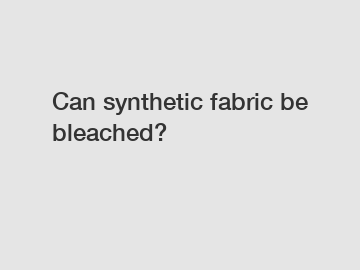Can synthetic fabric be bleached?
Can Synthetic Fabric be Bleached?
Synthetic fabrics have become increasingly popular over the years due to their durability, affordability, and versatility. However, when it comes to caring for synthetic fabrics, there are often questions about whether or not they can be bleached. In this article, we will explore the topic of bleaching synthetic fabrics and provide insight into the best practices for maintaining their quality and appearance.
Understanding Synthetic Fabrics.

Before discussing the bleaching of synthetic fabrics, it is essential to understand what constitutes a synthetic fabric. Synthetic fabrics are made from human-made materials such as polyester, nylon, spandex, or acrylic. These materials are manufactured through chemical processes and are engineered to mimic the properties of natural fibers like cotton or silk. Due to their synthetic nature, these fabrics can have different reactions to various chemicals, including bleaching agents.
The Effect of Bleaching on Synthetic Fabrics.
Bleaching is a chemical process that uses oxidizing agents to remove stains, whiten, or lighten the color of fabrics. However, synthetic fabrics do not respond to bleach in the same way that natural fibers do. While bleach can be highly effective in whitening or removing stains on cotton or linen, it may have adverse effects on synthetic fabrics.
Bleaching synthetic fabrics can cause them to become discolored, weakened, or even disintegrate. This is because the harsh chemicals in bleach can break down the fibers of synthetic fabrics, leading to irreversible damage. As a result, it is generally recommended to avoid using bleach on synthetic fabrics.
Safe Alternatives for Cleaning Synthetic Fabrics.
While bleach may not be suitable for synthetic fabrics, there are alternative methods for cleaning and maintaining their appearance. Here are a few safe and effective alternatives:
1. Pre-treating stains: Before washing synthetic fabrics, it is advisable to pre-treat any stains using detergent or a stain remover. Gently rubbing the stain with the pre-treatment solution can help loosen and break down the stain before washing.
2. Cold water wash: Synthetic fabrics can typically be safely washed with cold water. Using a gentle cycle and mild detergent can effectively clean the fabric without causing damage. It is essential to follow the care instructions provided by the garment manufacturer.
3. Air drying: Instead of using the dryer, which can cause synthetic fabrics to shrink or lose their shape, it is best to air dry them. Hanging or laying the fabric flat to dry can help preserve its quality and prevent unnecessary damage.
4. Ironing tips: Some synthetic fabrics can be prone to wrinkling. To remove wrinkles, it is recommended to use a steamer or iron on the lowest heat setting. Always test a small, inconspicuous area of the fabric before ironing to ensure that it does not melt or burn.
Conclusion.
In conclusion, synthetic fabrics should generally be avoided when using bleach. The harsh chemicals in bleach can cause discoloration, weakening, or disintegration of synthetic fabrics. Instead, it is best to use alternative methods such as pre-treating stains, washing with cold water, air drying, and ironing on low heat if necessary. By following these guidelines, you can maintain the quality and appearance of your synthetic fabrics without the risk of damage.
For more information on caring for synthetic fabrics or to find a reliable supplier, please contact us. We are here to assist you with any questions or concerns you may have in selecting the best products for your needs.
The company is the world’s best hospital fabric, poly/cotton twill fabric, wr fabric supplier. We are your one-stop shop for all needs. Our staff are highly-specialized and will help you find the product you need.


